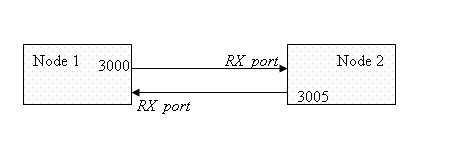const char* hname = "localhost";
Address * my_tx_addr = new Address(hname, 3000);
//configure sending port
Address * dst_addr = new Address(argv[1], (short)(atoi(argv[2])));
mySendingPort *my_port = new mySendingPort();
my_port->setAddress(my_tx_addr);
my_port->setRemoteAddress(dst_addr);
my_port->init();
//configure receiving port to listen to ACK frames
Address * my_rx_addr = new Address(hname, (short)(atoi(argv[3])));
LossyReceivingPort *my_rx_port = new LossyReceivingPort(0.5);
my_rx_port->setAddress(my_rx_addr);
my_rx_port->init();
|
const char* hname = "localhost";
//configure receiving port
Address * my_addr = new Address(hname, (short)(atoi(argv[1])));
LossyReceivingPort *my_port = new LossyReceivingPort(0.5);
my_port->setAddress(my_addr);
my_port->init();
//configure a sending port to send ACK
Address * my_tx_addr = new Address(hname, 3005);
Address * dst_addr = new Address(argv[2], (short)(atoi(argv[3])));
mySendingPort *my_tx_port = new mySendingPort();
my_tx_port->setAddress(my_tx_addr);
my_tx_port->setRemoteAddress(dst_addr);
my_tx_port->init();
|
